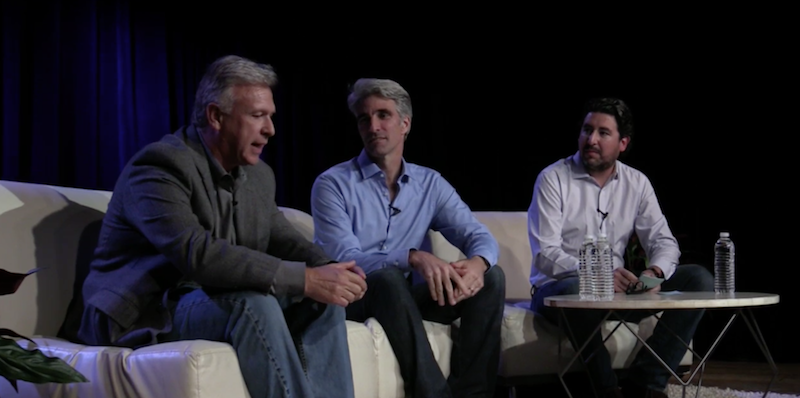Phil Schiller and Craig Federighi Talk iMessage, Siri API and Mac App Store on 'The Talk Show'A day after Apple's
WWDC keynote address, Apple SVP of Marketing
Phil Schiller and SVP of Software Engineering Craig Federighi joined
Daring Fireball's John Gruber on a special edition of his podcast,
The Talk Show. The duo addressed many topics, including the emphasis on iMessage in
iOS 10, opening up
Siri and other parts of iOS up to developers and the
Mac App Store.
<img class="aligncenter size-full wp-image-507416" src="

" alt="talkshowschillerfederighi" width="800" height="398" />
The bulk of Apple's presentation on iOS 10 was focused on the
extensive improvements to iMessage. When Gruber asked Federighi about the focus on Messages Federighi said the company knew that it was the app iPhone users spent the most time in, and the one they get the most excited about.
Every time we add emoji it would be the biggest thing. We work all year on a new file system or something and people are more excited about the two more emoji. So we figured if there's one place where we could make a difference in how people experience iOS it's Messages.
With iOS 10, Apple announced that many of its services would be opened up to developers. Siri
now has an API that allows developers to interface with it, iMessage includes
a new App Store that will allow developers to create stickers and payments for it, and
Apple Maps now allows developers to create extensions for their apps, allowing users to book a reservation or hail a cab via Maps.
Federighi and Schiller both said that Apple likes to create a baseline for its technology first, then allow developers to build on it. Federighi said this is illustrated by Share Sheets, which at first only featured Facebook and Twitter extensions that were built by Apple, rather than third-party developers. He said that once the company creates the systems they deem necessary for a feature, they feel comfortable opening it up to third parties.
Federighi said that Apple wants to give developers more opportunities to give users better experiences, and that if developers feel like they can help users get things done by invoking their apps through Siri they want to help.
Federighi also addressed the ability to
"delete" stock apps in iOS 10, clarifying that the apps are not actually deleted, with only user data and necessary hooks being removed if a user opts to delete the apps from his or her device. The apps themselves remain on the device as part of the signed package Apple uses to assure authenticity. "Re-downnloading" the apps from the
App Store doesn't actually involve a download and instead simply re-links the apps back into iOS so they can be used.
When asked why Siri's API is limited to certain kinds of apps, like ride-hailing services like Uber or messaging, Federighi and Schiller once again talked about Apple's baseline philosophy. Federighi said the decision to go with those apps types was made because Siri largely understands the domains of messaging and requesting purchases, making it easier to give the keys to developers and ensure a great user experience. He also said that Apple is working to expand Siri's familiarity with certain domains over time.
Recently, a survey
indicated that developers were dissatisfied with the state of the Mac App Store. Gruber asked Schiller and Federighi whether the store was a second priority for the company because of the popularity of the iOS App Store, which Apple recently revealed a slew of improvements for. Schiller said that Apple "loves all of our kids" and that they're very happy with the Mac App Store, noting that they think it's important enough to host their own apps on it. Apple thinks it's an important solution for the future of the platform and are dedicated to it.
Schiller said that Apple pushes to make sure that all things make as much sense as possible on all storefronts, and that they organize development time and resources based on what they think the need for some features are. For example, Apple felt like the need for TestFlight on iOS was more important than the need for TestFlight on macOS.
In the full talk, the pair also talks about Swift, WWDC lunch boxes, and more. The episode of
The Talk Show is not yet online, but it should be available in video form
on Daring Fireball in due time.
<div class="linkback">Related Roundup:
WWDC 2016 Tags:
The Talk Show,
John Gruber,
Phil Schiller,
Craig Federighi </div>
Discuss this article in our forums
<div class="feedflare">
<img src="[url]http://feeds.feedburner.com/~ff/MacRumors-Front?d=yIl2AUoC8zA" border="0"></img>[/url]
<img src="[url]http://feeds.feedburner.com/~ff/MacRumors-Front?d=6W8y8wAjSf4" border="0"></img>[/url]
<img src="[url]http://feeds.feedburner.com/~ff/MacRumors-Front?d=qj6IDK7rITs" border="0"></img>[/url]
</div><img src="
http://feeds.feedburner.com/~r/MacRumors-Front/~4/ipw2bhUWDME" height="1" width="1" alt=""/>
Source:
Phil Schiller and Craig Federighi Talk iMessage, Siri API and Mac App Store on 'The Talk Show'